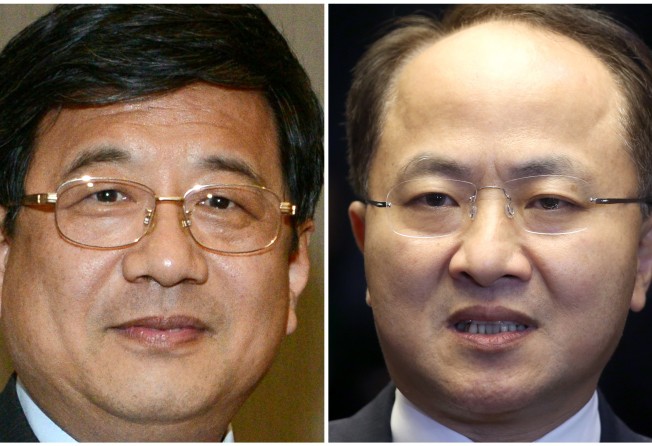Communist Party taps Beijing’s top men in Hong Kong for spots in elite Central Committee
The appointments are seen as another way the central government has pulled Hong Kong into the national agenda

Beijing’s top representatives in Hong Kong and Macau, along with its point man on the two cities’ affairs, have been elevated into the Communist Party’s newly reshuffled Central Committee.
It marks a shift from the arrangement five years ago, when only the Hong Kong and Macau Affairs Office (HKMAO) chief, based in Beijing under the State Council, was part of the body that helps guide the country’s policy and major personnel decisions.
Tuesday’s announcement by the Communist Party saw the installation of Beijing’s two liaison office chiefs in Hong Kong and Macau – Wang Zhimin and Zheng Xiaosong, respectively – into the 204-member prestigious powerhouse, alongside HKMAO director Zhang Xiaoming.
The appointments are seen as another way the central government has pulled Hong Kong into the national agenda, similar to the crucial role Beijing has said the city can play in initiatives such as the Greater Bay Area development plan.
However, some observers say the move shows Beijing’s reignited focus on what it considers to be potential sources of instability.
“The congress stresses that, in order to ensure the long-term prosperity and stability of Hong Kong and Macau, the policies of ‘one country, two systems’, Hong Kong people ruling Hong Kong, Macau people ruling Macau, and high degree of autonomy shall be comprehensively and correctly implemented,” President Xi Jinping said in the closing ceremony of the 19th party congress.
Incorporating Hong Kong into his speech, Xi added: “Along with people on the mainland, Hong Kong and Macau compatriots should share the historical responsibility of national revival and enjoy the shared glory of the country’s prosperity, affluence and strength.”
Xi earlier listed the task of implementing one country, two systems as one of his 14-point “Thought on Socialism with Chinese Characteristics for a New Era”, the country’s latest defining political dogma. He called for the melding of Beijing’s “comprehensive jurisdiction” with the policy of Hong Kong and Macau’s “high degree of autonomy”.
In the last congress, only the HKMAO director at the time, Wang Guangya, was selected as a full member on the Central Committee. Zhang, who was to head the liaison office in Hong Kong, was only an alternate member.
With the elevation of the current liaison office chiefs, some veteran China watchers say Beijing is strengthening its grip on the cities’ affairs.
“One of the prime tasks of the liaison office [in Hong Kong] is to unify the pro-China forces in order to diminish the support for the opposition or independence,” said Lau Siu-kai, vice-chairman of the Chinese Association of Hong Kong and Macau Studies, a Beijing-affiliated think tank. “The liaison office director, once appointed as a full Central Committee member, obviously wields more prominent power within the Communist Party.”
Johnny Lau Yui-siu, a China observer, said the party appointments were in line with Xi’s call for focus on Beijing’s comprehensive jurisdiction over Hong Kong.
“As all three key officials in charge of Hong Kong and Macau are now in the Central Committee, the Hong Kong and Macau policies under party general secretary Xi have been elevated,” he said.
The next focus for Beijing’s policies over Hong Kong and Macau will come on Wednesday, as a new Politburo Standing Committee will be formed. Zhang Dejiang, China’s former No 3 leader and the one in charge of the Communist Party’s working group on Hong Kong, is set to step down, leaving open a guessing game for the next in-charge of the group.
“Whoever will succeed Zhang has little implication for Beijing’s policies,” former HKMAO chief Wang said. “All the policies were set by [late paramount leader] Deng Xiaoping.”
Beijing sought to make its policies clear on the social media account of the Communist Party’s official newspaper on Tuesday, saying it was a misunderstanding that Hong Kong, under one country, two systems, could have full autonomy apart from foreign affairs and defence.
A commentary in the People’s Daily said the framework of the one country, two systems model was originally devised such that “one country” was the end and “two systems” was the means.
“It is very clear which one is more important,” the commentary said.
The commentary also sought to elaborate the meaning of the central government’s “comprehensive jurisdiction” over Hong Kong as put forward by Xi at the opening of the congress.
The paper cited a book published in 2015 by University of Hong Kong political scientist Dr Yan Xiaojun to sum up the central government’s power over Hong Kong: “The power to make law, interpret laws and amend the laws in regard to the establishment of the Hong Kong special administrative region; the power to set up the SAR’s government, monitor the chief executive and the SAR government’s law-making and governance, and to delegate new authority to the government; the power to directly manage the foreign affairs and defence of Hong Kong.”
Additional reporting by He Huifeng